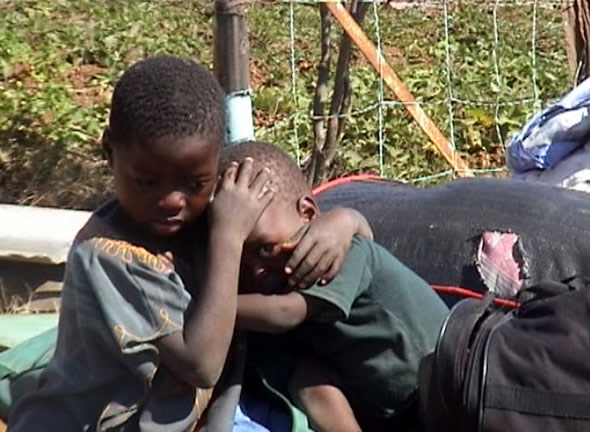By Derick Matsengarwodzi
TSUNAMI is a Japanese word associated with destruction. So, naturally, for over a decade now, it became synonymous with anything damaging in Zimbabwe.

Tsunami refers to a series of water waves caused by the displacement of a large volume of a body of water, generally an ocean or a large lake, earthquakes, volcanic eruptions and other underwater explosions to a strong wind that destructs everything in its paths.
Since 2000, Harare has been riding on this obliteration wave pattern.
Our landlocked motherland felt the repercussions of its own man-made Tsunami in 2005. This hazard included a ferocious propensity driven by the local government minister to demolish structures now classified as illegal.
Over time some home owners had resolved to construct cottages in their backyards. Although they had vast but costly rewards later on; they were cheaper to erect and beefed up erratic monthly earnings.
In some instances they enclosed the main houses rendering them invisible; it was common to meet up a new occupant each day you visit some domiciles. The sewage spillage had intensified so was the rubbish menace.
But people had to survive.
The boys’ quarters, as they were popularly called, were a clear reflection of a piling municipal housing back log. As a sole substitute for multitudes of redundant breadwinners, they were means of survival, even though the over-stretched system was visibly taking a pounding with no restrain in sight.
Then the authorities had a resolve.
Operation Murambatsvina – cleaning away the dirt. What they referred to as dirt were people’s homes; their sole means of survival in a land with none or diminishing prospects. These structures housed the vulnerable, political victims and opposition members.
On a bitter early morning of May in 2005, all the structures were to come down, spelt out Murambatsvina. Initially we all thought it was the usual flaccid ranting.
“How could they, after they had got our votes in the previous elections.”
How wrong we were – as usual?
Then on news bulletin visuals of the tsunami in Mbare, one of Harare’s oldest ghettos filtered through ZBC, the exclusive state broadcaster. An elderly Tuck shop proprietor wept pitiably as his source of survival and only investment crumbled in his forth.
Residential bungalows suffered the same fate.
Soon we knew front loaders would descend on our commune. Dwellers commenced the flattening of structures to waiver a proposed taxation while we chipped with our brute force. For some with properly sanctioned residences; it was a non-event. This calamity, for some causalities was too grisly to document.
Everyone sought to fold this sad chapter with a glimmer of hope. And soon we carted rubbles to restore our potholed roads. For some it was a revisit to their original nightly crammed sleeping postures in their petite habitats. Relatives were scattered in search of shelter.
The proclamation that “people were sprouting like mushroom” did not minus their predicament. If properly summed, it left many destitute. With no alternatives, no recourse, droves left for nowhere.
They were not alone.
Even the politically connected were downed as well. After the last police truck had left, I thought I had seen the last episode of cruelty in my motherland.
But more was coming.
Whilst campaigning for votes during the 2013 elections, residents were promised an elimination of their domestic bills. There was never mention of illegal buildings, which were also set to benefit from this recourse.
With the elections gone, reality brought back another Tsunami.
The electorate, who were convinced to register from their homes, were now regarded as illegal. Toddlers, women and the sick were exposed, facing the reality of their government. In addition, the scarcity of domestic supplies, hunger and proper medical supplies are beckoning.
What a wretched festive present for my people?
Christmas is coming but for those affected it will never be the same. For how can a family rejoice when the rains are pounding their property, knowing fully there is no recourse in sight? You have a party that is daring to beg for votes and soon after label the same constituency as illegal. What a nerve? Surely, there was registration of some of sort to include these people on the voter’s roll.
Only if all the resources spent to destruct homes could be invested into attacking the web of corruption; only if these bulldozers and front loaders could be diverted to provide a healthier sanitation and infrastructure for the people; and only when the responsible minister can testify on his party’s destructive tendencies, only then can we have a functioning society once again.
Without that, everything remains a pipeline dream for the nowhere people.
In order to revive the sunshine status, all political appointments and patronage have to cease. Those accused of parcelling state land did it fully aware that if caught, they can skip the political divide and join the ruling elite if they belonged to the opposition for immunity.
If these homes are illegal, how do they justify a minority who parcelled infinite acres of arable land amongst themselves, only for them to criminalise a desperate family trying to build a decent shelter on a minute 200 square metre plot?
Today the proceeds of gems are never enjoyed by the majority, yet the local government gather resources to demolish the little people have struggled to construct whilst water and electricity has ceased to flow into many homes.
If a politician’s larceny is permissible, hailed and swept under, then our nation hope is destined for the waste drain; all our exertions to rebuild and prosper are being swept by a Tsunami wave of greediness.
That’s not all. A recent finding by Human Rights Watch says Harare city is at significant risk of another cholera outbreak. As usual, officials deny the severity of the sanitation situation. And then we still anticipate progress for our people.
Cry out loud, the nowhere people.






